One-on-one with Alan Greenberger

Photo: Next American City Magazine
With the dog days of summer upon us and no August monthly meeting of the Philadelphia City Planning Commission, PlanPhilly sat down last Friday, August 21, with Executive Director Alan Greenberger to catch up on some of the issues he’s dealt with during what will soon be a year on the job.
Or perhaps “jobs” is the better word. The year has been more than Greenberger bargained for. He took on the title of “acting deputy mayor” for planning and economic development – and the responsibility for the city’s Commerce Department in addition to his own department – after the unexpected departure of former Deputy Mayor Andy Altman in June. And, of course, he took over the reins just as the worst financial meltdown in American history was in full throttle, affecting everything from the city budget to the very development projects that he, his staff and commissioners were considering.
At one point, asked how many meetings a week he attends, Greenberger offered an instant “day in the life” scenario, checking his handheld to see what occupied him on Wednesday, August 19. It was a day he characterized as “medium” busy (and on which he was supposed to have jury duty – postponed on account of his working the equivalent of at least two city jobs).
First, a meeting at City Hall with the Nutter administration’s core cabinet (9 a.m. to 10:30) was followed by an hour-long meeting with business people about the regional tech sector, until noon. Then lunch – a hotdog while walking back to his office. He had some business at City Hall, after which he was picked up by Philadelphia Industrial Development Corp. President Peter Longstreth at 1 p.m., for business at the Navy Yard. He returned to the Planning Commission at 3, and then it was off to the weekly economic development cabinet meeting. At 4:30 he got back to his office to return a couple of phone calls. He left at 7.
We spoke about the role of the Planning Commission (what it is, what it is not), his relationship with developers, and of course, casinos. The media, too, and how tough it is to get things done in the public world versus the private sector, where he toiled as an architect (Greenberger resigned as a partner at MGA Partners Architects when he took on his executive director position; he had been with the firm for 35 years). He also outlined an ambitious “integrated planning process” that will be introduced later this fall, which will meld planning with the ongoing work of the Zoning Code Commission.
The interview took place in Greenberger’s office on the 13th floor of One Parkway, and lasted more than 90 minutes. Most of the interview is below, but has necessarily been condensed and edited. Edits were made for repetition and clarity – and (most) small talk was cut. A couple topics were omitted, but his remarks on those subjects will appear in a forthcoming story.
We started with the current city budget nightmare on staffing levels at the Planning Commission and the Commerce Department, irrespective of the “Plan C” option outlined by Mayor Nutter last week, in which the entire 39-member Planning Commission would cease operations.
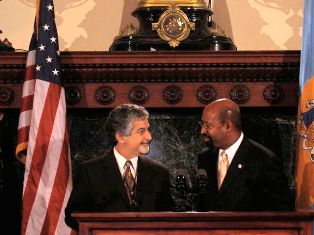
Thomas J. Walsh: Was it six staffers that were to be let go?
Alan Greenberger: Well, unfilled positions. We didn’t do any more layoffs in this last round because we have these unfilled positions. Somehow that’s been characterized as a bad thing. … Our capacity is diminished, but we’ve managed not to lay anybody off. … This next round – and hopefully there won’t be a next round – there’ll be bodies all over the place.
TJW: How about with Commerce – absent Plan C, are there any layoffs or unfilled positions there?
AG: There are some ongoing unfilled positions at Commerce, too, that was part of the contribution to the last round.
TJW: Enough to affect economic development, short-term?
AG: It depends on how much you think you can cover, with those that are left. And, you know, at some levels, it can be covered. I suppose someone could say, ‘How am I supposed to cover being Commerce director and the Planning director and the deputy mayor?,’ and it’s a fair question. I’m finding my way through. I work very hard – that’s one version of it, but I can’t cover all bases. I have good people working with me here, and we sort of have to shuffle how the bases get covered. The bases will, inevitably, not all get covered, but I think as you go deeper into the system, you simply wind up, truly, with diminished capacity, and an inability to do whatever it is you were doing before.
TJW: So there’s no answer as to when [former Deputy Mayor for Planning and Economic Development] Andy Altman’s replacement will be hired, or whether it’ll be one person or two?
AG: No. There’s been no decision on anything. It’s on hold, and given what’s going on at the moment, it deserves to be on hold.

TJW: You’ve been here almost a year now.
AG: Ten months. It only feels like 10 years. I feel like I’ve been doing this my whole life.
TJW: You’ve spent a big chunk of your life in the private sector – that’s a big transition. What’s the biggest difference? Is there a biggest surprise so far?
AG: The biggest difference in the public realm is that it’s very hard to get things done. I think some of it is just the nature of the beast. Some of it is understandable – part of the nature of the beast is this is sort of like any public entity. The reason the public sector doesn’t work as well as the private sector is that the public sector has numerous issues of accountability. They are legitimate, real and just part of public life. The more insidious part of it is that because of accountability, a lot of people who work for the public sector are nervous about taking responsibility. This is a common problem with bureaucracies. Private ones, too, but I think particularly public ones. The environment is sort of merciless. I don’t mean internally – let’s say, between me and the mayor – that’s fine. It’s actually the relationship to you folks. (Laughs) And then ultimately through you to the public.
TJW: We, the media?
AG: Yeah, and this isn’t ‘blame the media.’ But you transmit – you’re there watching what the public sector does. You transmit information about what the public sector does to the public. Sometimes you do it in a sort of very reporting method, and other journalists do it in a more interpretive method. It varies from person to person and from media organ to media organ. Some are more editorially based and others are more factually based – or at least make an attempt at it. It’s hard to do either way, actually. And then that information goes out to the public and the public feeds back their response directly to us, and also through the media. So you put yourself out there and you’re available for being criticized all day, on everything.
TJW: Damned if you do, damned if you don’t?
AG: There’s a certain amount of ‘Damned if you do, damned if you don’t.’ You have to make decisions. You’re inevitably criticized for those decisions. And that is different from what goes on in the private sector for sure (laughs). In the private sector you get to say, ‘Look, this is what we’re gonna do,’ and that might get criticized within the circle of impact of that decision, but basically everybody says, ‘OK, that’s what we’re gonna do.’
TJW: And this is where developers have their central dilemma, right? They are private unless they’re [real estate investment trusts], but they do run up against this very public aspect of their work.
AG: Yes, and they’re terrified of it because they see the kind of … (paused). These are business people. Most business people like to get things done quietly and efficiently, and sort of get on with business, so to speak. The idea that they would have to subject themselves, as these developers do, to a very public process, including an immense amount of public criticism – questioning their motives, oftentimes questioning their values. It’s painful for a lot of them and they develop either very thick skins about it, or they walk away and say, ‘I don’t want to do this.’
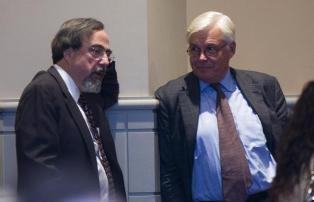
Michael Sklaroff and Craig Schelter
TJW: Have you been in contact with the owners, or their designees, of the riverfront parcels – Central as well as Northern Delaware riverfront?
AG: We haven’t done that in a kind of systematic way. I know several of them, starting with one of the more important ones – the Delaware River Waterfront Corporation [the city]. But we haven’t attempted to contact them, at least since I’ve been involved with them, systematically. That will happen – absolutely. As this master plan [for the Central Delaware River waterfront] moves forward, we have to do that.
TJW: Say, in the next six months or so?
AG: Yeah, I’d say so. We have to sort of systematically go through the lot, and talk to them about what do they have, what do they think they’re doing with it, what are their aspirations – do they have any aspirations? Are they looking for the public sector to shape what oughta happen or do they have their own vision? We need to get to the bottom of all that. Not because it’s necessarily determining – we just need to know.
TJW: Have any of them reached out to you?
AG: Yes, a few have reached out to us. The background to it is, ‘Look, this is a very bad economic time, nobody’s doing anything.’
TJW: It colors everything.
AG: It does color everything, so they’re kind of on hold. Since nothing is going to happen anyway, they’re sort of, I think, probably for many of them, they’re saying, ‘Alright, this master plan’s gonna happen, so … we’ll see what happens?’
TJW: Do you think that any of them – whether they be a big company like Conrail or a small independent owner … [have a mindset of,] ‘Let’s not waste this crisis’?
AG: Relative to what?
TJW: Relative to not working with the city. I’m thinking about all the concerns voiced by [Development Workshop Inc. Executive Director] Craig Schelter or [real estate attorney] Michael Sklaroff, wherein their clients’ private property rights are seen as, perhaps, being trampled on a little, with this process between the city and PennPraxis?
AG: Well we heard the arguments from Michael and Craig – I don’t think people’s property rights are being trampled. Obviously, they have points to make, but meanwhile the [overlay district] ordinance has passed; I don’t think it’s unreasonable to require at least the reservation of land for possible public access. I think there’s a lot of details to work out, but I think the big one is, yeah, put it in context of a plan. I truly feel that there’s less here to be feared than at least what was a little bit expressed during the zoning episode.
TJW: Do you think that’s blown over a little bit?
AG: Oh, yeah.
TJW: Craig has had a job in this office [Planning Commission executive director], was with PIDC…
AG: He was an executive director [with PIDC].
TJW: Now he’s representing many of these developers. Do you speak with him much now, and do you believe he’s playing a constructive role in the process?
AG: I think he does play a constructive role. I’ve known Craig for years, and he was an active participant in DAG [Design Advocacy Group] when I was part of that, and I think we forged a kind of professional relationship – and actually before that on the Foundation For Architecture board… People like Craig, and actually Michael Sklaroff too, are an essential part of the ongoing dialogue. Disagreeing with them is different from sort of resenting their presence. (Laughter.) I welcome their presence because I think that they voice real concerns that are out there and need to be acknowledged within the system. I may not agree with what they say, but also in the end you have to find a way to work together. They’re out there representing some of the property owners – certainly not all of them – and the Development Workshop represents real interests in Philadelphia that need to be cultivated. Mind you, this is not a thing where people ought to think there are simply sides to be taken – that you’re on one side or the other. This is a big city with a big, dynamic economy, and we all have to figure out a way to make this work, together. One of the things I have found myself saying – and I know Craig is aware of this – for instance with discussions about this 2116 [Chestnut Street, Hillman Center] project – is convening groups of community members who live, or whose institutions [are nearby], and saying to them, ‘Listen, you need to understand the reality of development, too.’
The world is not about evil developers with black hats and wax moustaches or something, stealing things from everybody. It’s not what life’s about. Development is a risky business – and in this city, with very thin margins of return. So, what I’ve said to them for example is, ‘A standard developer’s business sheet on a project is going to include an assumption about profit.’ A standard fee proposal from an architect includes an assumption about profit.
TJW: You’ve got to make a living.
AG: That is the theory. And the truth about architecture is that that profit is often whittled away to hardly anything, and part of the reason that you project it is that you have a cushion. Well, developers do the same thing, and they know they need cushions, and if they can make the kind of money they project, that’s nice, we’re thrilled. But things happen. Things happen all the time, and in a certain way… it doesn’t matter what profit margin they project. It doesn’t matter.
TJW: Why do you say that?
AG: It doesn’t matter because in the big world of development, the only thing that matters is whether the business sheet looks compelling enough to be financeable. Since developers in general are not financing things with their own money, they’re looking for financing, whether it’s a bank or an insurance fund or a [state] teachers’ retirement [fund] or an individual, or somebody – usually many somebodies – are financing projects. Those financing agents look at a business sheet and say, ‘good investment’ or ‘bad investment.’ It’s either financeable or not.
I think development is very tough in this city – it’s extremely tough.
TJW: What can be done to change it?
AG: There are several things. Certainly the critical thing is make the economy better. There are some things in our control and some things that’ll take a little longer term. We need to rationalize the process of development. Developers have been critical of the city for having a fairly complex process – there’s some fairness in the criticism, I think. There are possibly too many people looking at similar things. We need to organize that better and we’re in the process of doing that.
TJW: What, exactly?
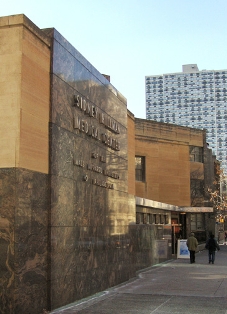
2116 Chestnut Street
AG: If you take a simple example, take 2116 Chestnut. It has to go through Planning, it has to go through the Historical Commission, the Zoning Board of Adjustment. And each of those groups, if you really want to be intellectually vigorous about it, each of those groups has a very specific agenda and mission that do not overlap. But from the public’s point of view, particularly that of the protestants, it’s just more bites at the apple. So issues often get conflated at these agencies that don’t necessarily belong there. One of the things I’ve tried to do is bring some clarity. When you take 2116 Chestnut to the Historical Commission, there’s a very precise reason for doing so, and from the Historical Commission’s perspective, they really need to stick to that agenda. When you bring it to the Planning Commission, it’s a very different agenda – we’re not there to do the Historical Commission’s job, and they’re not there to do our job. It’s important to be both articulate and explicit as we can be, in both helping people understand what issues belong where, but also limiting the discussion to the issues that are relevant.
‘Information-only,’ please
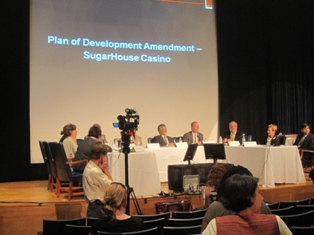
TJW: You said earlier this year to me that planning is a long season, like baseball…
AG: If I said that, that was smart. (Laughter)
TJW: You did, it was.
AG: I don’t remember saying that, but I’m gonna say it now. Ya win somes, ya lose somes.
TJW: …And, despite many of the positive changes implemented by Andy Altman and the mayor and yourself, there is still a feeling out there, among some, that the Planning Commission is still not quite as transparent as it could be. One example … why are the commissioners given packets of information that the public does not have access to? Are they proprietary developer materials?
AG: No. It ultimately becomes part of the public record in any case and we don’t have a problem showing it, but the way you phrased the question is set up to suggest that, somehow, we’re hiding something. I would reverse it and say our commissioners are appointed by the mayor to do a job for which they: A., have special expertise; B., are volunteering their time to do a civic duty; and C., as a result of that, they need to be more well-informed. They’re being asked to vote, at a particular public event, and it’s not fair to them to not make them reasonably well-informed before they have to make those votes. I think that’s a totally fair thing.
TJW: Is that something that members of the media could request to see?
AG: I suppose you could – I have not really followed through on what our policy on that ought to be. The information packets they get are pretty basic stuff. … There’s not much to it. It does, yes, often come with a recommendation [from the commission staff]. But the recommendation is rarely if ever interpreted. … The assumption is that it will be explained in a public forum.
I don’t know that anybody’s ever requested it. I haven’t thought it through. I would be certainly happy to talk that through here, but I’m not going to guarantee that the result will be what you want. There may be good reason why that stuff is never sent out in advance, not the least of which is that it’s that much more effort. We get these packets out to our Commissioners no more than a couple of days before the meetings.
TJW: Couldn’t stuff like that be reproduced on the [Planning Commission’s] Web site?
AG: In theory it could be. Again, more tasks to do. And the thing that you risk is that we often have to change – we find mistakes occasionally, and you get into this area where if you’ve made it public… You also have to follow up on last-minute changes… somebody inevitably will argue that there was not sufficient notice to somebody – you know, the law, or people’s understanding of the law, in this country, is a great tool for doing both good and bad. It happens regularly. The opportunity to basically make mistakes and then have them come back to haunt you because they were simple clerical errors is powerful.
TJW: So the ‘information-only’ session, which is fairly new… is that an attempt to deal with these kinds of questions that I’m asking, so that a project in the abstract can be put forward?
AG: Yeah, and we do it only with major projects. Because, the other unfairness to the commissioners – and to the public, too – is that, OK, you put a big project out there, they’ve never seen it, never been briefed on it. They haven’t been working on it with developers the way we have. Anything put out there that has some complexity, it inevitably has some major issues with it. You say, ‘OK, you’ve seen a presentation for 20 minutes, you’ve discussed it for five minutes, you heard people, usually, complaining about it, you’ve heard developers tell you why it’s a good thing and people tell you it’s a bad thing: Now decide.’ It’s not fair – these issues are more complex than that. So we decided that a smart way to do this was in information-only, so they get to see something and have basically a month or more to let it sink in.
TJW: This ‘absorption period’ that you’ve spoken of?
AG: Just to reflect on it. It also gives us an opportunity to hear from members of the public, in a public forum. So, anything from genuine concern to grandstanding, from informed opinions to pretty weird opinions, occasionally.
TJW: That’s the case sometimes, especially when anything related to casinos comes before you, but I’ve also noticed that some of the information-only presentations themselves have gone on for really long periods of time.
AG: Well this is the one where you want to get it all out. … I think it’s working very well. I think commissioners feel more secure about what they’re being asked to vote on when it’s a major project.
TJW: In between these information-only sessions and the time a developer might come back to you, perhaps for an approval of some sort, is there further communication?
AG: Not generally between ourselves [staff] and the commissioners.
TJW: Between the commissioners and the developers?
AG: Seldom. [The commissioners] are there to do a very specific job. It’s like a board. Some boards are very board-driven and some are very staff-driven. This is a very staff-driven operation, as would be normal for a planning commission. Their job is to be there and be a sort of check and balance on the staff. Without the information-only sessions, they would be making judgment calls generally with regard to what the staff has said without an opportunity to think about it themselves. In some ways it would be more unfair to the public, and probably be seen more as some kind of fix.

TJW: So there’s this fine line between too much information from the developers’ perspective and not enough for the media, which hopefully is thinking about the public.
AG: Well you guys want everything!….
TJW: Not necessarily!… (Laughter)
AG: In some ways, not in a bad way, I sometimes get the feeling that the media – I won’t say ‘you,’ but ‘the media’ – would just like to be sitting at the [negotiation] desk all the time. It’s like, we just can’t do that!
TJW: No, no – I think where I’ve been going with this is, can you explain why the commissioners – perhaps due to lack of expertise in this area – ask no financial questions whatsoever during these presentations?
AG: That one I can answer. It’s because it’s not relevant to the decision we have to make. The Planning Commission is not being asked to decide to move forward with something based on the financial viability of something.
TJW: Really?
AG: Yeah, really.
TJW: Even just general financial questions, such as ‘Is this realistic?’ or ‘Can you guys do this?’ ‘Can you give us a time frame?’ ‘What is the lending environment like right now?’?
AG: Here’s what you can assume, reasonably – it’s still not relevant to the decisions that the commissioners are asked to take responsibility for, which are planning decisions.
TJW: But doesn’t planning take into account financial viability, especially since there might be another building which is coming in for an information-only session the following month, which would be just across the street?
AG: Yes, but we can’t control that. And financial viability is a function of a lot of complex possibilities that exist for a developer that we just don’t have any control over. Here’s where we do control it. Occasionally something slips through, but I don’t want to put something before the commission that is financially ludicrous. Andy [Altman] and I had a conversation about this about the American Commerce Center. Andy said, ‘Alan, this thing’s not likely to happen – why are you investing commission time in this?’ And I said, ‘You can’t tell me that.’ I agree – it’s not likely. It’s a big ask. It needs tenants. But I said, ‘Andy, these are serious people who have invested serious money. They’ve brought in serious architects, they’ve hired serious lawyers. They’ve brought in traffic planners. They’re putting real money out to put an idea forward, and there is a model in which it works – namely, they find and land the big tenant in town.’ And if they do it, we can do this. It’s a long shot – I’ll grant you that. But it has passed that smell test. Having done so, it’s not really a Planning Commission affair. Our job is to establish whether this is a decent planning idea, based on our own analysis – it’s passed the giggle test.
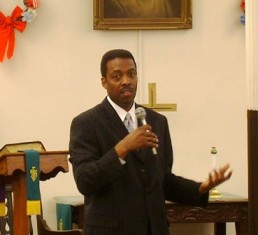
Councilman Darrell Clarke
TJW: Speaking of the American Commerce Center, talk to me about this ‘councilmatic prerogative’ problem. I think you said previously that Councilman (Darrell) Clarke was not a believer in this new process – that the Planning Commission has the final say on planning matters. Are there any other City Council members that feel as he does, and want to keep that traditional right to call the shots in their districts?
AG: It’s hard to say – there hasn’t been much development going on to test the waters. Most of the development that has gone on in the past year has either been in [Councilman Frank] DiCicco’s district or Clarke’s. They have very different points of view about this. Needless to say, I’m a fan of DiCicco’s point of view. But I respect Clarke’s.
TJW: Why?
AG: We didn’t put up any opposition to this legislation he had, to re-claim the final authority on the American Commerce Center.
TJW: Why not?
AG: It wasn’t worth the fight. He wasn’t there yet, and it was just not worth the fight. We have to do what we have to do as a commission, no matter what. Relative to the project, there’s no difference. We’re gonna have an opinion about it – it’s going to be informed, as it would be one way or the other, and we’re going to make it public. That’s all out there, no matter what. The only difference is that perception, I suppose, about accumulated power, and we’re not in this to accumulate power. We’re in this to professionalize decision-making.
I would acknowledge that with a lot of projects — and the American Commerce Center is certainly one of them – that there’s a strong political component to it because there’s a concern among a lot of people over whether it’s a good project or not. Politics is not my job. Clarke is a politician, and I think he felt that this thing still had a kind of political dimension to it, as it is out there in the public realm for debate. DiCicco [on the other hand]… says, ‘I don’t want to be in this business – I want these decisions to be run purely professionally because then [the Planning Commission] is taking the responsibility for it,’ and he’ll agree or disagree with it. … Clarke is not at that stage in his thinking yet, and I have to respect that.

TJW: Just overall, is there anything new on the American Commerce Center?
AG: Well they have signs down there on the site. The gig is that they need to find a lead tenant for this office building. …
Here’s the other thing I wanted to say about the economics of projects that does affect planning. In the past, a lot of developers would come to the Planning Commission and ask basically for relief from zoning that limited the amount of facility that they could do – that’s pretty much the most common thing. … There might be a rationale for it, there might not. What Andy and I got concerned about, if there was rationale or not, was that if they were granted that increase, they could turn around and flip properties, having just been given a major asset – we just increased the value of the property by ‘x’ amount. What did the city get for it? So we started talking about that, and said we shouldn’t allow that to happen. That’s giving out the candy and we’re not getting anything for it. What we said was, ‘Here’s what we want in return: a promise that, if we think it makes sense to give you the density, we want the assurance that you’re actually going to do it. Because our willingness to give you the density was predicated upon a particular approach to a site – a set of uses, a design or at least a design approach, and this is what led to the plan-of-development , and the insistence that the thing sunsets itself after a period of time.’ Now, we’re feeling pretty OK about extending that period of time in this economic environment when so little is happening.
TJW: Do you foresee more extensions like that in the coming six months or so, such as the Stamper Square project?
AG: Well we’ve already done it for Stamper Square.
TJW: Right, but would you again – a second extension?
AG: At some point, one’s patience wears out. And you have to weigh it against what the economy in general is doing. If Stamper Square is still hanging around there, not doing anything, but the rest of the economy is moving ahead, then clearly the problem is not the economy, it’s them, and that’s when you start losing your willingness to be sympathetic.
Projects: On simmer
TJW: I have a bunch of projects here I wanted to get updates on – the Hillman Center at 21st and Chestnut, the Southport Marine Terminal, the Monaco Hotel that would be at the refurbished Boyd Theatre – stop me if there’s any news on any of these.
AG: Nope.
TJW: Bart Blatstein at Broad and Spring Garden? David Grasso at 16th and Vine?
AG: Nope.
TJW: Cira Centre South?
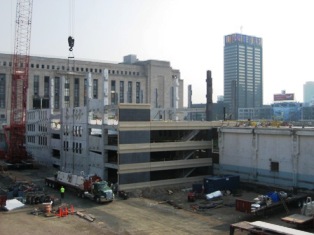
AG: [Brandywine Realty Trust CEO] Jerry Sweeney needs a tenant. He’s working on it!
TJW: How about Station Square – a more civic project?
AG: That’s about civilizing the road works around 30th Street. We’ve got a scheme, everybody likes it, and Amtrak seems to be OK with it … and we’re in discussions with PennDOT about how to get it done. So that’s all good.
TJW: Is that something we might see in the next year?
AG: Yeah, I think so.
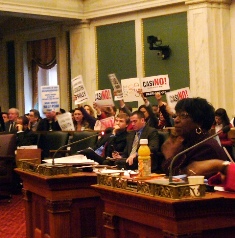
TJW: And then of course there are the casinos, which is where you see both development going on, and also very much not going on. Why is it, do you think, that Philadelphia is having such a hard time in general getting these things off the ground? Is that too broad of a question? It seems that if it’s not one thing, it’s another.
AG: Who was that [on Saturday Night Live] who used to say that – Rosanne Roseannadanna?
TJW: Right – I think it was, ‘It’s aaallways somethin.’
AG: ‘It’s always somethin.’ (Laughter)
TJW: Well, if the casinos are a ‘fait accompli’ as has been talked about, and absent the recession, do you think there would be at least one up and running right now?
AG: Sure. Well, here’s what we know about the two casinos. The SugarHouse one has applied for its permits. They’re moving ahead.
TJW: Actually they are having another big problem we just found out about (Editor’s note: See PlanPhilly, Aug. 19, ‘SugarHouse requests transfer of slots license’ http://www.planphilly.com/node/9670). And again, it’s financial – they are really hung up on getting a loan.
AG: Well, development ain’t easy. When we’re talking about private financing in this particular environment, it is clearly a mess. … And the gaming industry is down, too – anybody who is financing anything knows that the sort of investment euphoria that came with that business has really been tamped down by an economy that really stinks. …And even though the other Pennsylvania casinos are doing well, the old saying when you were buying stocks is that, ‘Past performance is no guarantee of future performance.’ … So the fact that they’re doing well right now in a soft economic environment does not necessarily mean, particularly in the investment community, that they’re going to do well in the future. … And I suppose the investors are asking themselves a lot of hard questions, and then ask the developers a lot of hard questions, and that’s when you get into a lot of lawyer time. … Now I assume, and I didn’t know about SugarHouse’s last little chapter here, but I assume that they’ll work at it and are committed to solving problems.
On the other one (Foxwoods), I have no idea what their problems are. I assume they’re financial.
TJW: What’s the latest you were told?
AG: Nothing. There’s truly nothing to report. (Editor’s note: The Pennsylvania Gaming Control Board is scheduled to hold a hearing on Friday, Aug. 28, to decide on extending Foxwoods’ slots license. In May, Foxwoods officials requested an extension of its license because it had moved the project from Columbus Boulevard to the former Strawbridge & Clothier department store at 8th and Market streets.)
We meet every week – an interagency working group on casinos. Planning, Commerce, the legal team – we all meet. Every week – we’ve done it faithfully for a year or so now. When this was all unfolding more aggressively a year ago, we just thought these things are going to move ahead fast and we need to be responsive – we need to know what the hell we’re doing. Well, now, I’m insisting that we keep holding these Monday meetings, but at times there’s not much to talk about. … When we get to Foxwoods, it’s ‘Anybody hear anything?’ ‘No.’
TJW: How often do you ask them – call them up for some sort of update?
AG: We check in with Foxwoods about once a month at this point, just to say, ‘Anything happening?’ ‘No.’ … Something’s going to have to happen sooner or later. Whether it’s they come to a conclusion that they’re moving ahead and figure out how, or they don’t seem to be going anywhere and the state Gaming Commission or the governor starts pounding the table, saying ‘What the hell’s going on?’ and that causes some action. Or, PREIT says, ‘You know what, I can’t sit around with an empty building much longer – I’m gonna go find some tenants.’ At some point, one of those things has to happen. I guess the other one is Foxwoods’ people could say, ‘We can’t make it work – we’re done.’
The fall season: ‘discreet, targeted planning’
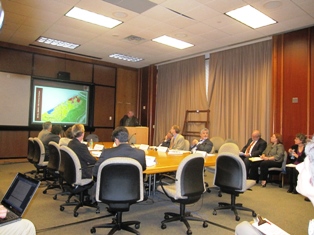
TJW: Is there anything pressing for the Planning Commission come the fall?
AG: The one thing that the staff is going to bring before the commission, which is very important to us, is a model for what we’re calling an ‘integrated planning process.’
TJW: What’s that about?
AG: Well, we’re re-writing the zoning code. … The ultimate goal of that [re-written zoning] book is to re-map parts of the city. All they’re doing is re-writing the code – they’re not re-mapping anything yet. In order to do a re-mapping, you have to have a plan – you have to know what you want to do.
So if you start working backwards from all of this, you start to say that, ‘We’ve already taken a comprehensive look at the city, at the same time that this code, this book, is getting fixed,’ so that 1. the two processes can inform each other – that’s important; and 2. more important is that at the end of it all, that we have these two things in our hands: a strategic look at the city as a whole. Where are the big, transformative ideas over the next 20, 30, 40 years? The ideas that are going to unlock some potential about Philadelphia that it doesn’t currently have, or doesn’t think it currently has? From that, we then have to look at discreet areas of the city and do what are, in effect, district plans, that help us understand how to use this new zoning code and re-map the city. That’s going to have to be a rolling process. You can’t do it all at once. We have to start defining what those districts are. … We’re trying to think of them as ‘the geographies that are understood by people as their sphere of influence.’ … You measure your sphere of influence by the geography that influences you by shopping, what the kids do, commuting patterns, crime and open space – I would say those are the big ones.
We just said what we need to do is do some discreet, targeted planning in these kinds of spheres of influence that for some reason gel. Like with Manayunk and Roxborough – geographically isolated, it’s obvious – anybody who lives in Roxborough, anything that happens in Manayunk is going to have some effect on their lives. We need to look at planning in these areas to help figure out what to do with the re-mapping. A lot of re-mapping will be re-categorization. … We’ve compressed the number of different kinds of residential neighborhoods in the new zoning code.
TJW: To the lay person, what is the difference between re-zoning and re-mapping?
AG: They are the same thing, fundamentally. [With the zoning code,] all it is, is the rules. The re-mapping is how they apply to you. That’s where the rubber’s going to meet the road. We think, our hunch, is that the heart of the re-mapping is going to look at certain topics. Among them will be transit-oriented development – meaning a baseline belief that we should be able to accommodate more mixed-use and more density around transit nodes.
We’re [also] going to be needing to look at commercial corridors, because in this city, where over a 50-year period we lost 25 percent of the population, neighborhood commercial corridors tend to be too long, with scattered vacancy, and they probably need to be tighter. A three-block, no-vacancy commercial corridor is better than a six-block commercial corridor with lots of vacancies – just fundamentally better. Zoning could help move that arrow and help direct that. It’ll be over a period of time, nobody’s going to be put out of business – ideally you’d have to have grandfathering. … We have too much unproductive commercial area that needs to be better.
TJW: And I know industrial lands have been at the forefront of what you’ve been looking at.
AG: The third thing is industrial, yes. We’ve got to look at the land that is just out-and-out obsolete zoning. Most of it is industrial. The industrial land use report that they’re putting out at the [Philadelphia Industrial Development Corp.] is really starting to identify which areas of the city that had robust industry and is now not so robust, and that we’ve got to … push to transition.
TJW: So the priorities for the Planning Commission in the coming year are obvious – they’ve already been set in motion by the Zoning Code Commission?
AG: Right…
TJW: And to bring that code to fruition, you have to re-map, and you have to have a plan to re-map.
AG: Right. And that’s a process that has to be integrated with a strategic look at the whole city, looking at districts of the city, and with the ongoing flow of the re-write of the rule book itself. And so we’ve developed this integrated idea, a timeframe and a way that the pieces all connect, that we want to bring in front of our commission.
TJW: When should we expect to see that?
AG: Probably October. The only thing we have to do is figure out how to pay for this.
TJW: That’s all, huh?
AG: We’ve got some ideas that we’re exploring. We’re meeting with some acceptance of our ideas, but we have to put them into effect, and right now … discussions are just on hold. But I think that’s going to be a big deal for us, because that’s really what I came to this job to do. Ultimately, the headline is, ‘City embarks on first comprehensive plan in 50 years.’
TJW: You were in private practice for 35 years – is that something that you really saw as a barrier to proper development and proper planning over the years as an architect?
AG: Yeah, I think they’re barriers. … A city that has not updated itself, has not allowed itself the benefit of deep, long-term thinking – we suffer from that. We suffer economically, and as a competitive economic entity. It ties to quality of life. [Deputy Mayor of Parks and Recreation] Michael DiBerardinis and I have had a lot of conversations about public open space in the city and we’re very much on the same wavelength about how that interrelates with economic development and planning in the city. So like I said, this is what I came to do.
TJW: What can we expect in terms of the Design Review Board, which was proposed earlier this year?
AG: It’s totally on me. It’s purely me being distracted by a lot of other things. I’ve got to get that back on the agenda.
TJW: Well, Alan, thank you very much.
AG: Sure.
Contact the reporter at thomaswalsh1@gmail.com.
WHYY is your source for fact-based, in-depth journalism and information. As a nonprofit organization, we rely on financial support from readers like you. Please give today.



